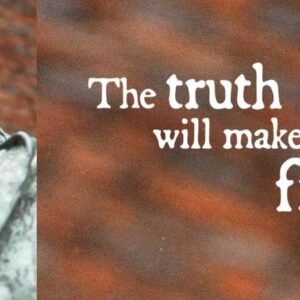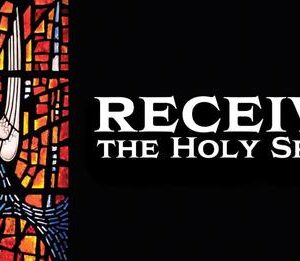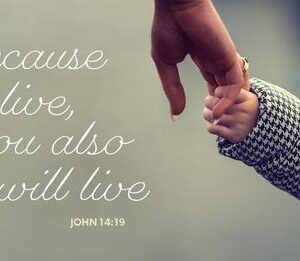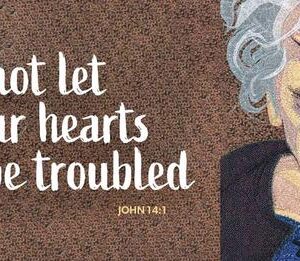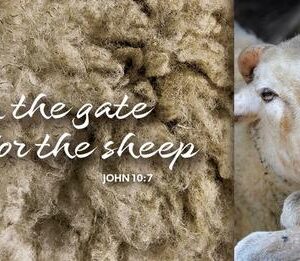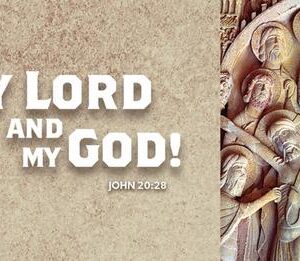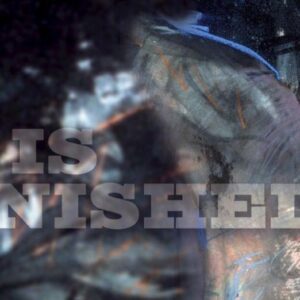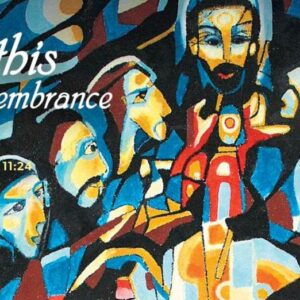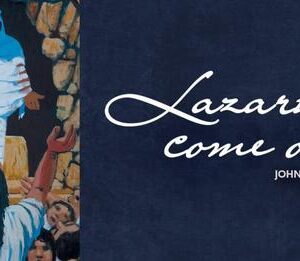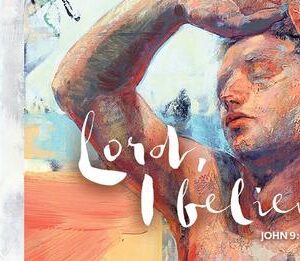Good Friday 2023
John 18:1—19:42
The Passion of Our Lord Jesus Christ according to John
————————
Please pray with me tonight, church:
Holy and Crucified One,
Behold us, your children.
Fix our eyes on your suffering and anguish.
Strengthen us to behold your death,
That we might behold our life.
Amen.
————————
We tend to look away. Our eyes searching for anything else to land on.
We don’t like to look upon things that make us hurt. Or uncomfortable.
We don’t like to look upon pain. Especially pain we may have had a role in causing.
The Great Three Days…the Triduum…Maundy Thursday, Good Friday, and Easter…invite us deeply into the betrayal, suffering, death…and too, the resurrection of Jesus. These Three Days implore us to look…or maybe more appropriately, one of my favorite biblical words, to behold.
The last words in our service tonight beg us to that same reflection: “Behold, the life-giving cross, on which was hung the Savior of the whole world.”
It is in looking upon the pain and suffering of Christ, in not averting our gaze, that we begin to understand within our innermost being…at our most cellular level…the pain, suffering, hurt, injustice, and brokenness that Christ died in order to overcome.
Did you catch that?
It’s not that our sin was so bad that God’s anger could only be satisfied by the death of God’s son. How many of us heard that growing up?
No, it’s that only through the death of Christ that the powers of death, those things that seek to deprive you of life, are overcome. Christ dies, so that you would live.
Don’t look away. Don’t avert your eyes.
Behold…the life-giving cross.
“Behold” makes an appearance a few times in the Passion narrative according to St. John. Twice it is said by Pilate, and twice by Jesus. After Jesus had been stripped and beaten and flogged, Jesus is mockingly dressed in a purple robe and a crown of thorns as Pilate says to the murderous crowd, “Behold…here is the man.” And again, just a few verses later, right before Jesus is taken away to be crucified, Pilate declares to those clamoring for Jesus’ crucifixion, “Behold…your king!” To which the religious leaders and the frenzied crowd shout back, “We have no king but the Caesar!” forgetting of course the terrible oppression and subjugation they lived under as occupied people of the Roman Empire.
How often do we reject inconvenient and difficult-to-come-by love, simply in favor of a status quo or fear of disrupting the way things are, even if the way things are is oppressive and actually deprives us of life?
Love might be a more difficult path, dear children, but love will never compel you to live in bondage to forces that deprive you of life. To love like Jesus will demand your life, but in losing your life you will gain it.
Later, when Jesus says “behold”, as he’s hanging on the cross, John writes that Jesus looked down from the cross and saw his mother and the disciple whom he loved standing beside her, and said to his mother, “Woman, behold your son.” Then he said to the disciple, “Behold, your mother.”
It’s unclear to me who is beholding whom in this encounter. I imagine it’s left intentionally vague. Inviting reflection. Imploring you not to look away.
Behold…the life giving cross…on which was hung the Savior of the whole world.
It is in looking upon pain and suffering, it is in not averting our eyes, that we are opened up to transformation. In truly beholding the pain and suffering of the world, your heart is transformed and broken apart and you begin to ask the world where the hurt is…you begin to ask how you can help alleviate some of this brokenness.
And in the great paradox that is somehow always true with God, in beholding the pain and suffering of others and in doing what you can to alleviate that hurt, you will find that your own hurt and pain and suffering are attended to as well. Often by others, who can often see our hurt and brokenness better than we can ourselves, if we allow them. Losing your life, in order to gain it.
Yesterday, on Maundy Thursday, we talked about Jesus who sees our needs, who kneels down to wash and bless our feet, and who cares for our weary souls. And in patterning our lives after the life of Jesus, we strive to adopt that same posture, we seek to see the world as Christ sees the world.
These are the eyes with which Christ views the world, dear church.
Eyes that behold suffering…and pronounce healing.
Eyes that behold one’s captors and enemies and executioners…and pronounce forgiveness.
Eyes that behold death…and dare to defiantly pronounce life.
Out of pain and hurt and suffering, God brings healing and restoration and wholeness.
Out of your pain and hurt and suffering, through the cross of Christ, God dares to bring healing and restoration and wholeness.
God would die before God would let you remain in bondage to your sin—to the ways in which you separate yourself from God and from each other.
God takes what is used for destruction, and uses it for salvation.
God takes what is meant for execution, and uses it for resurrection.
God transforms the means of death into the means of life.
Behold…the cross.
Behold…life given for you.
Behold…your salvation.
Behold.
The life-giving cross.
On which was hung the Savior.
Of the whole world.
Maundy Thursday 2023
John 13:1-17, 31b-35
1 Now before the festival of the Passover, Jesus knew that his hour had come to depart from this world and go to God. Having loved his own who were in the world, Jesus loved them to the end.
2 The tempter had already put it into the heart of Judas son of Simon Iscariot to betray Jesus. And during supper 3 Jesus, knowing that God had given all things into his hands, and that he had come from God and was going to God, 4 got up from the table, took off his outer robe, and tied a towel around himself. 5 Then Jesus poured water into a basin and began to wash the disciples’ feet and to wipe them with the towel that was tied around him. 6 He came to Simon Peter, who said to him, “Lord, are you going to wash my feet?” 7 Jesus answered, “You do not know now what I am doing, but later you will understand.” 8 Peter said to Jesus, “You will never wash my feet.” Jesus answered, “Unless I wash you, you have no share with me.” 9 Simon Peter said to him, “Lord, not my feet only but also my hands and my head!” 10 Jesus said to him, “One who has bathed does not need to wash, except for the feet, but is entirely clean. And you are clean, though not all of you.” 11 For Jesus knew who was to betray him; for this reason he said, “Not all of you are clean.”
12 After Jesus had washed their feet, had put on his robe, and had returned to the table, he said to them, “Do you know what I have done to you? 13 You call me Rabbi and Lord—and you are right, for that is what I am. 14 So if I, your Lord and Rabbi, have washed your feet, you also ought to wash one another’s feet. 15 For I have set you an example, that you also should do as I have done to you. 16 Very truly, I tell you, servants are not greater than their master, nor are messengers greater than the one who sent them. 17 If you know these things, you are blessed if you do them.
31b “Now the Son of humanity has been glorified, and God has been glorified in the Son. 32 If God has been glorified in the Son, God will also glorify the Son in God’s self and will glorify the Son at once. 33 Little children, I am with you only a little longer. You will look for me; and as I said to the Judeans so now I say to you, ‘Where I am going, you cannot come.’ 34 “I give you a new commandment, that you love one another. Just as I have loved you, you also should love one another. 35 By this everyone will know that you are my disciples, if you have love for one another.”
————————
Please pray with me this evening, church:
Holy God,
Teach us love again tonight.
In water and washing, show us what love looks like.
Help us receive love.
So that we might be love.
Amen.
————————
We’ve arrived at kind of the midpoint of Holy Week. From Palm Sunday up until now, we haven’t gathered together for worship, but Jesus has been busy. Cleansing the temple, teaching, healing…and today we remember a meal Jesus shared with the disciples. And from this point on, the activity and the drama really start to pick up. Through these Great Three Days, we’re hurtling toward Jerusalem, the cross, Calvary, the tomb, on to Easter dawn.
But tonight we pause to remember a meal and a profound act of service and love.
What’s the thing that you just have to do before beginning any meaningful or significant activity? What’s the thing that you have to do before you can do anything else of consequence?
I have to brush my teeth. Before going anywhere or doing anything important, I have to feel like my mouth is clean. It just feels better to me.
Jesus enters this moment, this pivotal hinge point of Holy Week, where, I imagine, a few of us might start…with a meal. The beginning of the end of Jesus’ earthly ministry and life begins with eating. A meal among friends. A dinner between teacher and followers. Shared food for the journey that lies ahead of all of them.
So what do you have to do, church, before embarking on any serious undertaking in your life?
How are you coming to this hinge point in Holy Week?
I have a good group of friends and colleagues who make a habit of setting aside time every Wednesday of Holy Week to go get pedicures. I did it once with them in seminary. The logic is, as pastors, in the midst of a week busier than any other time in the church year, it’s important to take time for a little self-care, as well. That, and if we’re going to be washing feet, we might as well have nice-looking and nice-smelling feet. I’m sure you agree.
Do not worry, church, pedicures are not a prerequisite to having your feet washed this evening. Interestingly, I would say that it kind of misses the point. It’s your feet, just as they are, that Jesus is interested in washing and blessing.
Or your hands.
I get it. Some of y’all aren’t feet people. I hear you. Accommodations have been made.
But here’s the thing, for 40 days we’ve traveled this Lenten pilgrimage together. From Ash Wednesday, being marked with dust and reminded of our deep mortality, to now as we culminate in the final week of Jesus’ earthly ministry, our feet are tired. They should be. As we’ve turned our focus inward on ourselves this season, hearing God’s call to discipleship on our lives, and wrestling with the sometimes harsh realities of our patterns of behavior that are not reflective of who God is calling us to be, 40 days feels like a long trudge. Weary is the road we’ve trod these past weeks. Our feet, our hands, are in need of some rejuvenating care.
And into this great need of feeling worn out and in need of care, Jesus gets up from the table, sees your need, and bends down to wash and bless your feet.
For a people in need, this footwashing is a deeply meaningful act of service. We generally like to wash our own feet, but I’ve also spent enough time in hospitals and rehab facilities to know that not everyone has the ability at all times to wash their own feet. Not to mention the two little ones in my house, one of whom probably could wash his own feet if he wanted to, but whose feet I also take responsibility for. Sometimes we need someone else to care for our feet.
Some folks have a strange relationship with feet. They just don’t like them. I’m not that kind of person. I don’t mind feet, they don’t bother me. Generally speaking, we’ve all got them. And our feet do a lot for us. They get us around from place to place. They let us stand and talk with friends, or stand at a counter and cook dinner for loved ones. Our feet help us to jump and play and run. They help us dance and get our groove on.
Our feet are awesome. And I bet we don’t give a whole lot of thought to how we care for our feet.
Or hands, for that matter. We’ll have a handwashing station in just a moment for those who prefer. The absolute same could be said for our hands. They do a lot for us and for others, and I just don’t think we give a lot of thought to how we care for them.
To me, the act of footwashing or handwashing, and specifically, having someone else wash your feet or your hands is an act of tremendous vulnerability. And an act of care. A lesson in humility. And service. And it’s a profound act of love.
It’s a teaching moment for Jesus. “If I, your teacher and Lord, have washed your feet, you also ought to wash one another’s feet.” In other words, I’ve set for you an example for how you ought to be in this world as my disciples. Followers of Jesus are to be known for service to others—a literal posture of servanthood and humility. The rest of the world values power and strength, followers of Jesus are in a race to the bottom, outdoing one another in service and love of others.
“By this will everyone know that you are my disciples, if you have love for one another.”
Not through your religiosity. Not through your spiritual report card. Not through your ability to defend your viewpoints or win arguments. Not through your self-righteousness. Not even through all the good things you’ve done.
But through your love. If you have love for one another.
Through the way you love.
And love costs you something. Always.
It costs part of yourself. Love will cost you the need to win every argument, or the need to feel superior to other people. Love will cost you a certain amount of respectability by asking you to stoop down and take the posture of a servant. Love will cost you the perfectly manicured façades you feel like you need to display to the world by finding you hanging out with, serving, and loving all the so-called wrong people.
I said it on Sunday morning, Holy Week is about participation. And Jesus models this participation. Sharing a meal. Having your feet or your hands washed. These intimate and tender actions are at the heart of what it means to share and have love for one another.
“One who has bathed does not need to wash, except for the feet, but is entirely clean. And you are clean, though not all of you are clean.”
The author of John goes on to say that Jesus was talking about Judas Iscariot…and that might have been the case…but as I reflect, there are parts of me that feel unclean… There are parts of myself that I’d rather keep hidden from Jesus. There are parts of me that betray Jesus, that are less than the ideal follower of Christ, that don’t always live as God wants me to live… There are parts of me that feel unloveable by God…
Perhaps you, too.
“You are clean…though not all of you…is clean.”
Be honest, church, about those parts of yourself.
Be truthful about your need to wash up.
Difficult as it is, be honest about them.
Do you really think God doesn’t know those parts of you already?
Your participation is invited.
Bring your dusty and weary souls to be washed.
Bring your dusty and weary selves to this feast of mercy and grace.
Welcome to these most holy days. Welcome to the Triduum—the Great Three Days.
The beginning of this end has begun.
First, we wash. Then, we eat.
Find compassion here. Hold love in your hands.
Be renewed, strengthened, and nourished to love a world wrestling with its own unloveable places.
Come, beloved.
This gift of love is for you.
Fifth Sunday in Lent 2023
John 11:1-45
1 Now a certain man was ill, Lazarus of Bethany, which was the village of Mary and her sister Martha. 2 Mary was the one who anointed the Lord with perfume and wiped his feet with her hair; her brother Lazarus was ill. 3 So the sisters sent a message to Jesus, “Lord, the one whom you love is ill.” 4 But when Jesus heard it, he said, “This illness does not lead to death; rather it is for God’s glory, so that the Son of God may be glorified through it.” 5 Accordingly, though Jesus loved Martha and her sister and Lazarus, 6 after having heard that Lazarus was ill, Jesus stayed two days longer in the place where he was.
7 Then after this he said to the disciples, “Let us go to Judea again.” 8 The disciples said to him, “Rabbi, the Judeans were just now trying to stone you, and are you going there again?” 9 Jesus answered, “Are there not twelve hours of daylight? Those who walk during the day do not stumble, because they see the light of this world. 10 But those who walk at night stumble, because the light is not in them.” 11 After saying this, Jesus told them, “Our friend Lazarus has fallen asleep, but I am going there to awaken him.” 12 The disciples said to him, “Lord, if he has fallen asleep, he will be all right.” 13 Jesus, however, had been speaking about Lazarus’ death, but they thought that he was referring merely to sleep. 14 Then Jesus told them plainly, “Lazarus is dead. 15 For your sake I am glad I was not there, so that you may believe and trust. But let us go to him.” 16 Thomas, who was called the Twin, said to the other disciples, “Let us also go, that we may die with him.”
17 When Jesus arrived, he found that Lazarus had already been in the tomb four days. 18 Now Bethany was near Jerusalem, some two miles away, 19 and many of the Judeans had come to Martha and Mary to console them about their brother. 20 When Martha heard that Jesus was coming, she went and met him, while Mary stayed at home. 21 Martha said to Jesus, “Lord, if you had been here, my brother would not have died. 22 But even now I know that whatever you ask of God, God will give you.” 23 Jesus said to her, “Your brother will rise again.” 24 Martha said to him, “I know that he will rise again in the resurrection on the last day.” 25 Jesus said to her, “I am the resurrection and the life. Those who trust in me, even though they die, will live, 26 and everyone who lives and trusts in me will never die. Do you believe this?” 27 Martha said to Jesus, “Yes, Lord, I believe that you are the Messiah, the Son of God, the one coming into the world.”
28 When she had said this, she went back and called her sister Mary, and told her privately, “The Teacher is here and is calling for you.” 29 And when Mary heard it, she got up quickly and went to him. 30 Now Jesus had not yet come to the village, but was still at the place where Martha had met him. 31 The Judeans who were with her in the house, consoling her, saw Mary get up quickly and go out. They followed her because they thought that she was going to the tomb to weep there. 32 When Mary came where Jesus was and saw him, she knelt at his feet and said to him, “Lord, if you had been here, my brother would not have died.” 33 When Jesus saw her weeping, and the Judeans who came with her also weeping, he was greatly disturbed in spirit and deeply moved. 34 Jesus said, “Where have you laid him?” They said to him, “Lord, come and see.” 35 Jesus began to weep. 36 So the Judeans said, “See how he loved him!” 37 But some of them said, “Could not the one who opened the eyes of the blind man have kept this man from dying?”
38 Then Jesus, again greatly disturbed, came to the tomb. It was a cave, and a stone was lying against it. 39 Jesus said, “Take away the stone.” Martha, the sister of the dead man, said to him, “Lord, already there is a stench because he has been dead four days.” 40 Jesus said to her, “Did I not tell you that if you believed, you would see the glory of God?” 41 So they took away the stone. And Jesus looked upward and said, “Father, I thank you for having heard me. 42 I knew that you always hear me, but I have said this for the sake of the crowd standing here, so that they may believe that you sent me.” 43 When Jesus had said this, he cried with a loud voice, “Lazarus, come out!” 44 The dead man came out, his hands and feet bound with strips of cloth, and his face wrapped in a cloth. Jesus said to them, “Unbind him, and let him go.”
45 Many of the Judeans therefore, who had come with Mary and had seen what Jesus did, trusted in Jesus.
————————
Please pray with me this morning, church:
God of new and abundant life,
The new thing you are doing in our midst
May not be all that obvious to us at first.
Keep calling us to pay attention.
Keep calling us out of the graves we shut ourselves up in.
Keep breathing life into our dry and weary bones.
Amen.
————————
I can be a generally stubborn person. Often I have an idea in my mind about how a particular encounter should go, or an expected outcome of what I think should happen. I tend to trust my instincts, knowing that I have given the situation a good amount of thought, weighed a variety of potential options, and arrived at what I think is the so-called “right” conclusion. And when that conclusion, which, in my mind, may as well be foregone, is not arrived at by someone else or by the universe, I tend to not take it super well. I can get upset or angry, I might argue, but oftentimes I will try to bend the arrived-at conclusion back to what I think the end result should have been. And that usually involves me very stubbornly and incessantly hammering a very square and inflexible peg into a very round and equally rigid hole. Which serves absolutely no purpose, except to give me sore arms and back pains.
I tend to also be somewhat impatient. Anxiously waiting for the universe to just catch up to the conclusion I’ve already arrived at.
And I say all of this to say, our little 8×4 raised bed vegetable garden is teaching me a lot about myself, and the ways the world works, and just how much I think I know and just how little I actually do know.
Aside from a few very small cold snaps over the past few weeks, we’ve been blessed with a relatively early and mostly comfortable spring this year. Which has allowed our family to start in our garden. Much earlier than we did last year. But in my mind, some of the plants and vegetables should have come back where we planted them. But then again, that hard freeze we had back a few months ago would argue differently. Here comes that immovable and inflexible round hole I was talking about…
By the time the freeze arrived, our plants had long stopped producing, we had trimmed them back, and were hopeful that some new shoots would spring up from what was there before. But then the freeze came. And things died. And they became really dead. Like, dead dead.
And when things die—when they’re dead dead—no matter how much we may want, no matter how stubborn I might be, there is just no coaxing life from them. What’s needed is to turn over the soil, add in some new dirt, replant, and begin again. Begin again, so that I can anxiously and impatiently wait for the tomatoes and jalapeños and blueberries to grace the ends of those new shoots once again.
When something dies…and it is dead dead…we really must do a few things all at once. We can grieve what’s been lost. We can give thanks for what was. And we can look hopefully and expectantly for what’s to come. All at the same time. And each of these is important. If you leave out any one of them, the process is incomplete. Grieve…give thanks…hope.
When Jesus finally arrives at Bethany, Lazarus is dead dead. In fact, when Jesus got word two days beforehand that Lazarus was sick, Jesus stayed where he was, almost ensuring that when he finally arrived that Lazarus would be dead dead.
“Jesus if you had been here my brother would not be dead.”
If you had come when we sent word to you at first, you could have made him better, you could have healed him. But instead you stayed, and Lazarus died, and maybe we just want someone to blame and right now you’re a pretty convenient target.
We don’t like death. Perceived preventable death, in particular, makes us angry at the injustice and unfairness of it.
Ezekiel was written within the context of the Jewish exile in Babylon. When the Hebrews were taken to Babylon they were free to marry, build houses, start lives, elect leaders, plant crops, and even worship. But many of them were still angry and upset over the destruction of their holy city and temple in Zion, and so they had a really hard time worshiping and singing God’s song in a strange land. They weren’t where they wanted to be, or where they were supposed to be, so this sadness seeped down to their core, deep into their bones. And after years and years, those families and houses and the way of life they had carved out for themselves and the nice things they had filled their lives with…they started to supplant the need for God. Kind of like we have a tendency to do in the midst of great pain and hurt, the Hebrews filled their lives with things that are not God in an attempt to fill the void of not feeling near to God while they were in exile.
How many of us use stuff to try and fill a God-shaped hole in our lives?
And it is into this lifelessness that God calls the prophet Ezekiel.
Into Lazarus’ very real death—“My Lord…he’s been dead for four days…he stinks…”—Jesus seems to say, don’t miss what’s coming next.
“Prophesy to the bones,” God tells Ezekiel. “Remind them who they are. Tell them that life is coming.”
I’ve had to contend with my stubbornness over expected outcomes this week. I wanted to see a certain result, and even though it’s becoming clear that that result will probably never be, I’m still trying to force that peg into a spot it stands no chance of fitting into.
So I set it aside. I tried to examine it without judgment. I talked about it with those close to me. I tried to gather information.
And then I prayed about it.
Church, I don’t want to oversimplify the difficult task of making important decisions, many of which have very real and lasting impacts on people and organizations, but I do want to say that I prayed about it, I talked to God about it, and I slept on it, and I got to a place earlier this week where I could truly see another way. Perhaps there’s another peg that might fit in this spot, too.
It’s clear that the author of John is trying to prefigure Jesus’ own death and resurrection in this account of Lazarus. There’s foreshadowing…there’s the ever-zealous Thomas exclaiming, “Let’s go with him so we may die, too!”…the burial clothes, the weeping…this is all in anticipation of what will happen to Jesus and the stories we’ll encounter beginning next week with Palm Sunday.
But Lazarus’ story is not Jesus’ story. There’s one big glaring difference.
Lazarus will die again.
Many theologians make the distinction between the raising of Lazarus and Jesus’ resurrection. They call Lazarus’ story a resuscitation. In other words, Lazarus was dead, Lazarus was raised to life, but Lazarus will die again. Jesus, on the other hand, was resurrected, ascended to God, and is the source of everlasting and abundant life. Jesus doesn’t die again.
There’s a difference in resuscitation and resurrection.
Lazarus comes out of the tomb, and aside from burial cloths hanging off his body and a really powerful stench, Lazarus looks pretty much the same as he did before he died. But in all the post-resurrection stories about Jesus, one theme you’ll hear a lot in these narratives is that “their eyes were kept from seeing him.” There’s something about the resurrected Jesus that isn’t at all like the Rabbi the disciples traveled around with.
Resurrection is transformation. It looks nothing like what came before it. It’s totally different.
As we consider where things are at in our neighborhood and in our community of faith, what are we longing for?
As you look out into that parking lot, some Sundays struggling to find a parking spot, you might be encouraged at first, but then you realize that a good number of those cars and people are headed over to the Community Center, to our friends at St. Thomas Church. And you might be thinking to yourself, “Don’t they know we’re here, too? What happened to the full parking lot where everyone was coming here to this sanctuary?”
I am not immune to feeling a small amount of jealousy. I want folks to worship and praise God here, too. But I also need you to recognize that they are, church. New friends have joined New Hope in the past few years and are active and vibrant contributors to our shared ministry.
Pay attention to the signs of new life that are popping up. They may not be where you’re expecting.
So what are you longing for? Are we longing for a resuscitation? A longing for what used to be? Or are we hungering after resurrection? Is it transformation we’re after?
In both cases, the old thing has to die. It has to be dead dead.
So I’ll ask you, church…what do you think we’re still holding onto? What do we need to let go of?
What might we need to let die…like become dead dead?
To borrow images from the past few weeks, what water jugs do we need to leave behind? What perceptions need challenging? What story do we need to be telling incessantly and fervently? What needs to be born again? What is it that is springing up in you like a wellspring gushing up to abundant life? What bones are dead that need prophesying to?
Because the Lord is calling you, church. God is calling us.
To prophesy to these bones. To say to these bones, “The Spirit of the Lord is upon you. Hear the word of God.”
God will breathe upon these dry bones. Breath will enter them.
You will stand up. And you will live!
Bone will come upon bone. Flesh and muscle and tendons will cover you.
God will reach into your graves, tear you out of those places of death, and give you life!
God is breathing into you, dry bones.
You will stand up! You will live!
And you will know that the Lord is God.
Resurrection is coming, dear children.
New life is on the way.
Hope may feel lost right now, but joy arrives in the morning.
More than a few years ago, when it felt like things were going really, really well, I was super-aware within myself that the harvest we were enjoying was due to the patient planting and watering and nurturing of those that came before me long before I ever arrived in Missouri City. But I may not have done as good a job at saying that out loud or publicly.
This is a season of planting, church. A season of clearing away, of turning over the soil, of putting some new dirt down, and planting. This is a season of watering.
This is a season of nurturing.
Growth is coming. New life is getting ready to spring forth.
God has promised it.
Wait and watch for what happens next.
Fourth Sunday in Lent 2023
John 9:1-41
1 As Jesus walked along, he saw a man blind from birth. 2 His disciples asked him, “Rabbi, who sinned, this man or his parents, that he was born blind?” 3 Jesus answered, “Neither this man nor his parents sinned; this young man was born blind so that God’s works might be revealed in him.
4 We must do the works of the One who sent me while it is day; night is coming when no one can work. 5 As long as I am in the world, I am the light of the world.” 6 When Jesus had said this, he spat on the ground and made mud with the saliva and spread the mud on the man’s eyes, 7 saying to him, “Go, wash in the pool of Siloam” (which means Sent). Then the young man went and washed and came back able to see. 8 The neighbors and those who had seen him before as a beggar began to ask, “Is this not the man who used to sit and beg?” 9 Some were saying, “It is him.” Others were saying, “No, but it is someone like him.” The young man kept saying, “I’m the one.” 10 But they kept asking him, “Then how were your eyes opened?” 11 He answered, “The man called Jesus made mud, spread it on my eyes, and said to me, ‘Go to Siloam and wash.’ Then I went and washed and received my sight.” 12 They said to him, “Where is he?” The young man said, “I do not know.”
13 So the people brought to the Pharisees the man who had formerly been blind. 14 It was a sabbath day when Jesus made the mud and opened the young man’s eyes. 15 Then the Pharisees also began to ask him how he had received his sight. He said to them, “Jesus put mud on my eyes. Then I washed, and now I see.” 16 Some of the Pharisees said, “This man is not from God, for he does not observe the sabbath.” But others said, “How can someone who is a sinner perform such signs?” And the Pharisees were divided. 17 So they said again to the blind man, “What do you say about him? It was your eyes he opened.” The young man said, “He seems to be a prophet.”
18 The religious leaders did not believe that he had been blind and had received his sight until they called the parents of the man who had received his sight 19 and asked them, “Is this your son, who you say was born blind? How then does he now see?” 20 His parents answered, “We know that this is our son, and that he was born blind; 21 but we do not know how it is that now he sees, nor do we know who opened his eyes. Ask him; he is of age. He can speak for himself.” 22 His parents said this because they were afraid of the religious leaders; who had already agreed that anyone who confessed Jesus to be the Messiah would be put out of the synagogue. 23 Therefore the young man’s parents said, “He is of age; ask him.”
24 So for the second time they called the man who had been blind, and they said to him, “Give glory to God! We know that this man is a sinner.” 25 The young man answered, “I do not know whether he is a sinner. One thing I do know, that though I was blind, now I see.” 26 The religious leaders said to him, “What did he do to you? How did he open your eyes?” 27 He answered them, “I have told you already, and you would not listen. Why do you want to hear it again? Do you also want to become his disciples?” 28 Then they reviled the young man, saying, “You are his disciple, but we are disciples of Moses. 29 We know that God has spoken to Moses, but as for this person, we do not know where he comes from.” 30 The young man answered, “Here is an astonishing thing! You do not know where he comes from, and yet he opened my eyes. 31 We know that God does not listen to sinners, but God does listen to anyone who is devout and obeys God’s will. 32 Never since the world began has it been heard that anyone opened the eyes of someone born blind. 33 If this person were not from God, he could do nothing.” 34 They answered the young man, “You were born entirely in sin, and are you trying to teach us?” And they drove him out.
35 Jesus heard that they had driven out the young man, and when Jesus found him, he said, “Do you believe in the Son of humanity?” 36 The man answered, “Who is he, sir? Tell me, so that I may believe in him.” 37 Jesus said to him, “You have seen him, the one speaking with you.” 38 The young man said, “Lord, I believe.” And he worshiped Jesus. 39 Jesus said, “I came into this world for judgment so that those who do not see may see, and those who do see may become blind.”
40 Some of the Pharisees near Jesus heard this and said to him, “Surely we are not blind, are we?” 41 Jesus said to them, “If you were blind, you would not have sin. But now that you say, ‘We see,’ your sin remains.”
————————
Please pray with me this morning, church:
Loving God,
We want to see Jesus.
We want to be aware of you in our midst.
But often our eyes are closed to the
New thing you’re doing among us.
Give us eyes to see and ears to hear, this morning.
Give us vision.
Amen.
————————
Look, I think we all did a great job of picking up a number of good health and hygiene habits over the past three years. I think most of us probably learned some new things. But it has never really been considered sanitary to put someone’s spit in your eyes. It’s just not. This is not a new pandemic rule, we’ve understood this for a while. Keep your bodily fluids to yourself, Jesus.
It’s also interesting to me that Jesus never asks this young man if he can rub spit-mud in his eyes or even if he wants to receive sight…but this sermon is not about consent. That’s for another time, I guess. But, just to get it out of the way…yes, consent is very important. We’ve been working on that with a very touchy toddler recently…with varying degrees of success. Mostly unsuccess.
But Jesus almost seems tangential to this story from the Gospel according to John this morning. I mean, Jesus only makes 2 appearances, at the beginning and at the end. The rest of the story and dialogue takes place between this young man born without sight and the Hebrew religious leaders, who are just incensed that Jesus would do such a thing as heal someone, much less do so on the Sabbath. Man, doesn’t that hit close to home? How often do we get our hackles up in the church because someone wants to do something a different way or try something new altogether? Anyway, the young man and the Pharisees are just talking past each other, the Pharisees trying to figure out what’s going on and how they might catch Jesus doing something he shouldn’t be, and the young man who’s really just relaying his experience of receiving sight and who it was that did this in the first place. Plus, the kid’s parents get involved. It’s like a really bad game of telephone.
I don’t think the Pharisees are questioning honestly here, I think their motives are not innocent, but there is a moment, right at the end of our reading, when the religious leaders, perhaps in a moment of clarity and introspection, ask a very revealing question.
“Surely we’re not blind……are we…?”
This season of Lent we’ve been talking about hunger, both physical and spiritual hunger, and the things our heart and our spirits hunger and long for. This morning, I want to talk about our hunger to see clearly.
How can we be attentive to what God is doing in our midst?
How can we be open to being challenged by a different perspective?
How can we be mindful of the times in which we’re standing in the way of God doing what God would like to do with us, with our community, and in our world?
I’ve preached before about this Gospel reading from John, and how my preaching professor in seminary absolutely hates it. He’s now a Bishop in Michigan, Bishop Satterlee is legally blind and, in his words, he’s never seen “normally.” He says something similar to the following: “I’ve never seen in a way that folks would call ‘normal’ so I don’t know what that means. My inability to see is part of me, it’s who I am. And so, in the great resurrection of all things, when all things are finally reconciled back to God in their fullness, will I still be blind? I should certainly hope so! If the resurrection of the body means that our bodies become most fully themselves in their most perfect forms, I should think that my most perfect form is some perfect form of me with my blindness. My inability to see is just as much a part of me as my hands or my feet, or the fact that I’m a pastor, or my identity as a baptized and beloved child of God. I don’t believe God’s desire is to ‘cure’ me of my blindness.”
Here’s the money line. Bishop Satterlee says, “Heaven isn’t a place where I can see. Heaven is a place where it doesn’t matter that I can’t.”
Heaven isn’t a place where I can see. Heaven is a place where it doesn’t matter that I can’t.
The hunger to see clearly isn’t about vision with our eyes, it’s about attentiveness. Attentive to the ways in which “the way things are” can become a stumbling block to the proclamation of the Gospel and people meeting and seeing Jesus. What if heaven is a place where we open ourselves up, get out of our own way, and accommodate for those who have been told their whole lives that who they are is somehow sinful, that who they love is wrong, and that the thing that troubles them is some sort of divine punishment? Church, the blindness that God is seeking to cure us of is our blindness to the suffering and hurt of our neighbors, particularly our neighbors the world views as less than, the marginalized ones who aren’t valued by the world’s standards, the unexpected ones.
David was the unexpected one by literally everyone in that story from First Samuel. Jesse had seven of his sons stand in front of Samuel and each time, they weren’t the one God was choosing. Samuel was just as surprised as Jesse. And it wasn’t until Samuel pressed further—“Are all your sons here?’—that David the young shepherd is brought to Samuel and Samuel finally hears an approving word from the Lord.
The young man in our gospel didn’t wake up that morning expecting to receive his sight. The religious leaders didn’t expect Jesus do be able to do what he did, least of all on the Sabbath. The God revealed in Scripture over and over again subverts our expectations, and over and over again I feel like we’re surprised when God does an unexpected thing.
So what did you come here expecting this morning, church? What brought you here?
Did you come here expecting to see Jesus?
I will confess to you, my siblings, that I don’t know that I really expect anything on Sunday mornings. Or Wednesday nights. I’m not sure I’ve thought very much about what I expect. I don’t know if I expect to see Jesus.
But last Sunday after worship, someone who wasn’t getting many answers from their doctors asked me to pray with them and to pray for healing. Not to do the thing that their doctors can’t do, but just to call out to God in a time of distress, to ask God for help. And so I went and I got my favorite little red book and my little jar of anointing oil and we prayed and I anointed their hands and forehead and wouldn’t you know it, Jesus showed up. Not in a miraculous healing, but in calm spirits and the easing of burdens.
On Wednesday night at our Lenten Midweek worship I read most of that whole gospel from John about the Samaritan woman that you heard last week and my kid was doing laps around the Fellowship Hall for most of it, but then we started in on our table discussions and he brought me a picture he had started drawing with pens I happened to have and he said, “Look Dad, it’s the story. Here’s the well, and here’s Jesus, and here’s the woman, and they’re sharing.” Wouldn’t you know it, church, Jesus showed up.
Why am I so surprised when God shows up unexpectedly and does an unexpected thing…?
Church, where do you see Jesus here? Where does God show up?
I truly believe that we want to see and encounter Jesus, but we don’t always. Sometimes we’re blinded by our own expectations or lack of. So how can we make space for that unexpected appearance? How can we be vessels of Jesus to each other and to a hurting world? How can we make it easier for Jesus to show up?
Sometimes healing isn’t always wellness, but it is wholeness.
In this story, the young man happened to receive his sight, but I think the healing came there at the end of the story. After all this back and forth, the young man is driven out of the synagogue because the powers that be just can’t abide the restoration to wholeness that’s taken place. And it’s just then that Jesus finds the young man again and restores what’s been broken. After being ostracized and put out from the synagogue and the community, Jesus comes to the young man to restore him to wholeness. “Do you trust in the son of humanity?”
“Tell me who he is, so that I might believe.”
“You have seen him…the one who speaking to you.”
“Yes Lord…I believe…”
Surely we’re not blind…are we…?
“If you were blind, you would not have sin. But now that you say, ‘We see,’ your sin remains.”
If we say we have no sin, we deceive ourselves and the truth is not in us.
Where are we turning a blind eye to, church?
What are the unexpected places that God might be doing a new thing that we might be fearful to partner with God in bringing to life?
Is it our partnerships with our many ministries outside these walls? How many of you who volunteer at Armstrong or Eat Fort Bend or Family Promise, how many of you regularly meet Jesus in those volunteer opportunities? Quite a few, I bet…most, I imagine…
Where is God showing up unexpectedly?
Our Welcome and Inclusion Group is going through a training process to help us ask questions as a congregation about our intentional and explicit welcome and hospitality, specifically to members of the LGBTQIA2+ community. As we move through the Reconciling in Christ process, I want to urge us to be attentive to the unexpected ways God is showing up and moving in our midst.
“Surely we’re not blind, are we?”
I don’t think we want to be. I truly believe we want to see Jesus.
Be attentive, church.
Attentive to the unexpected ways God is showing up.
Attentive to Jesus in our midst.

